Internship at the university of madeconia’s jean monnet center of excellence
06/12/2016
International Conference “Applying non-discrimination law”, TCCI March 3-4 2017
28/02/2017Impressions

Impressions about the debate on racism and xenophobia:
Tasos Pavlopoulos, PhD Doctor of Law, Aristotle University of Thessaloniki
“We participated in one-from many sides-valued the conference. The area of focus itself- racism especially our time and our society, is marked by increased interest on behalf of the members of the academic community, and many others. In informative presentations culminating open round discussions the scientists and civil society have joined their voices condemning racism and xenophobia. Congratulations to the organizers Professors and their deserving colleagues.”
Dr. Christos Baxevanis, Postdoctoral Researcher at the University of Macedonia and experts (Rapporteur) the European Economic and Social Committee.
On June 10, 2016 I had the great honor and pleasure to participate in a roundtable discussion by the Centre of Excellence Jean Monnet University of Macedonia. From my behalf I would like to thank and congratulate all the organizers and speakers, especially Ms Despina Anagnostopoulou, Associate Professor at the Department of International and European Studies UOM for the honorary invitation and the excellent organization of a very topical and serious issue which concerns not only Greece but Europe as a whole.
In the year 2015, the reports of racist attacks and passerive violence against refugees and migrants increased significantly compared with 2014, as confirmed in the relevant report of the Network Recording Incidents Racist Violence. Among other reported attacks incidents where the victims suffered injuries, many times by several perpetrators, while the action of organized groups in the neighborhoods has not disappeared. There are also missing data on the extent to which the bias of certain employers coupled with the vulnerability of the foreign residents can lead to extremist attacks against them, while a daily occurrence of refugees and immigrants becoming victims of verbal attacks and targets of actions with strong stereotypical characteristics, and economic exploitation, thus marginalizing them even further. Important also remains that the number of recorded incidents is still uniformed. Further, there are plenty recorded cases of discrimination based on ethnic or racial origin. Typical is the Nigerian citizen case holder of an asylum seeker card, concerning the breach of a declaration by a private company in a position to which he has formally had been admitted and was invited to take service because of ethnoracial origin (Case 187370/2014) which came to the Ombudsman after reporting.
Unfortunately, I met such cases, personally during my time as President to Appeal Committees (n.3907 / 11). During the examination of asylum claims on appeal, in particular through the interview process, often witnessed similar incidents. A common feature of all these cases has been the reluctance to share their experience and in particular the lack of trust to turn to the competent authorities of the Greek state, fearing that this would further complicate their daily lives. There is no doubt that the Greek state has made progress, particularly through the creation of Racist Violence Response Department at ELAS for reporting incidents to the police. Significant progress has also been observed in the prosecution of racist crimes on the definition of the Special Prosecutor in Athens and Piraeus, with the amendment of Article 81 A CC and the establishment of the National Council Against Racism and Intolerance, as well as the establishment of network for a unified monitoring system for racist crimes, in cooperation with the police and courts.
Required, however, even more, is the focusing on combating human trafficking, drug trafficking, prostitution and crime, along with measures of relief of the entire population and improve the security climate. Key, however, to effectively tackle racist violence is the integration policies and social inclusion refugee and immigrant policies. As Greece today bears a great burden of the Syrian refugee crisis, the smooth integration of new entrants and the integration of immigrants already residing in the Greek territory is the next bet with Europe will have to win as a society and as a civilized world.
Impressions of participants in the Summer Academy:
Munchelou Anna
Congratulations for the successful organization of the Summer School!
The Summer School was a new and enjoyable experience for me. I think it is a chance to deepen your knowledge in certain areas. The content of the lectures was specialized and much updated, this is the basic reason I think the summer school was interesting and had so many participants.
The speekers had considerable experience and were available to answer any questions and pass on their knowledge.
Concerning the duration of the lectures and the breaks, as said by other participants too, the breaks should last a bit more.
Relating to the tuition fees, I cannot assess whether the cost is quite high, judging from me, if Mrs Anagnostopoulou had not given me a 50% scholarship, I think it would be difficult for me to participate. Maybe the tuition fees are an important factor for someone when deciding to participate or not.
And a small detail! It would be better if the award ceremony was a bit more formal! Moreover we must not forget that we achieved a difficult test!!
In conclusion, Chrysothea had a very good idea, to make sometime a reunion in order to know each other better since we had not the opportunity to do it during the Summer School.
Nikolaos Georgitsopoulos
For a modern Lieutenant of the Greek Police is absolutely essential, in addition to my police duties, to monitor and analyze everything that happens in the European Union and directly affects our country on issues developed at the summer school concerning the Schengen agreement, immigration policy, the asylum, the European criminal law (organized crime, human trafficking, terrorism) and European procedural law (mutual recognition of judicial decisions). This is the major asset Ι gained from my participation in the summer school, which I believe would be extremely valuable for both my future studies and overall general development.



